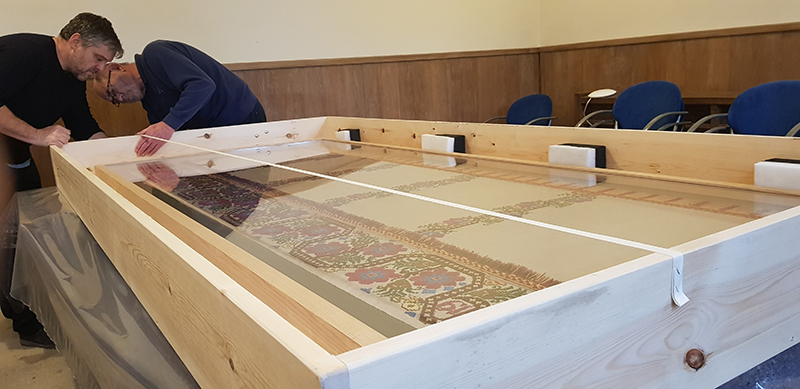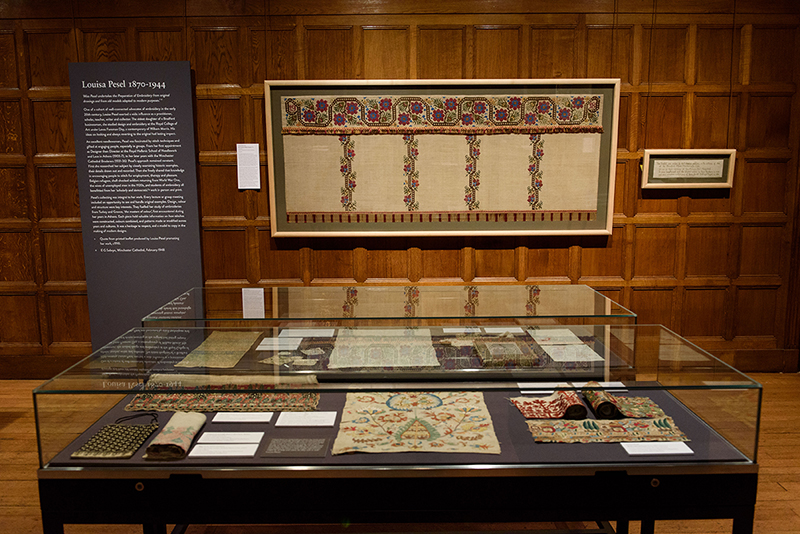The Louisa Pesel altar cloth made by the men for the Abram Peel Hospital Chapel, that has been hanging in the Bradford Cathedral chapter house, is currently on loan to Two Temple Place as part of their exhibition Unbound Visionary Women Collecting Textiles. We spoke to Rebecca Hone, Head of Exhibitions at Two Temple Place, to tell us a little more about the cloth, the exhibition and her role.
Could you tell us a little about yourself?
I’m the Head of Exhibitions at Two Temple Place. I work very closely with the curators of the exhibition and our partner organisations. Our Winter Exhibition Programme has been developed to showcase regional public collections. We look to partner with museums, galleries and collections from outside London, and we also want to support emerging curators.
We don’t have a particular theme or medium of objects that we want to include in an exhibition; we’re very open to a variety of collections. In the past we’ve had exhibitions on Egyptology, modernism, and jazz, and this year it’s called Unbound: Visionary Women Collecting Textiles. We were approached by three women – June Hill, Amanda Game and Jennifer Hallam – who proposed this exhibition. They wanted to put on an exhibition to highlight the importance of textiles. We employed as an assistant curator – Lotte Crawford – and June Hill to be the lead curator. My work is to work very closely with them and as they develop the object list and narrative as I organise the logistics, such as transport, and speaking to lenders, whether those are our partner organisations or organisations like Bradford Cathedral, where there’s an important piece of work outside of our partner collections that fits into the narrative of the exhibition. The altar frontlet that we wanted to borrow accompanies the Louisa Pesel collection from the University of Leeds. I also co-ordinate the interpretation and the essays that are produced in the catalogue.
It must be a challenging role, but a fascinating one to be involved in?
It can be quite a challenge. It’s very different every year, which is exciting, as there’s a new group of artists, artworks and collections that I work with, so I’m constantly learning something new. We learn as much from our partners, if not more, as they learn from us.
The Louisa Pesel piece has come from Bradford Cathedral and there is also work from Cartwright Hall; was it important to work with groups from across the country?
Absolutely. That’s really key to the mission of what we do at Two Temple Place. We want to showcase collections from outside London. We really want to reach areas and collections that we haven’t been to, or worked with, before, like Cartwright Hall in Bradford. In Unbound all seven collections are new partners for us. What’s a delight in my job is that I’ve known some of these collections already but I’ve also been introduced to many new ones. Like with Bradford Cathedral, I didn’t realise it had such an amazing altar frontal within their collection. It’s a great joy to get to know these collections.
What can people expect and get from the exhibition?
I would say lots of things. What is really exciting for me is that you learn about seven remarkable women. Historically, museum collections have been collected by men and we’re highlighting some of the women who have collected. We’re also bringing to the fore such a range of textiles, which is a huge, huge term for so many different types of objects.
I hope that we’re opening up the idea of textiles as something that’s historically, socially and culturally important, but also they are works of art very much in their own right. We’re able to showcase lots of objects that people may not have classed as textiles, but also to encourage new visitors to come in and really enjoy viewing the textiles. Within the exhibition, the seven collections are very, very different and included within that are twentieth century English dress and costume, early twentieth century Balkan dress and costume, contemporary international art and some mid-century printmakers and fabric designers. It’s a huge idea of what comes out under the term of textiles, which is very exciting. I think people will come away with new stories about interesting women, their lives and hopefully some inspiration to build your own collections and build their understanding of the term textiles.

In relation to the altar frontal in Bradford Cathedral, Louisa Pesel did important work in therapy following the first world war?
She was instrumental in starting the Khaki Handicraft Club in Bradford in 1918, which was a club for men that had been in the first world war and had been suffering from shell shock. She taught them needlework and sewing as a form of therapy. She collection Greek and Turkish embroidery, but she was also an embroideress and a very talented sewer and pattern maker. She was inspired by Greek and Turkish embroidery and she taught these men how to sew as this type of therapy, a very early form of how art and crafts, and sewing, can help people’s mental health and well-being. She was absolutely ahead of her game on that front.
As well as the exhibition, you also offer supplementary activities, including to London schoolchildren. Is that an important part of what you do?
It is. We have a really strong education programme. We offer free literacy and creativity workshops to state schools in London boroughs, and we have 33 places and they’re almost all booked up. They are really successful. We also offer lots of family activities. We have a family trail which takes you through the exhibition as a collector yourself, and we have an extended events programme including talks and tours and adult workshops. We try and offer a variety of events throughout the exhibition, hopefully letting a new group of people access the exhibition and helping visitors further explore the ideas and themes of the exhibition. They can also get creative themselves and learn something new, and we sometimes use our talks and tours to discuss themes that we haven’t really been able to develop within the exhibition itself.
Finally, what are your plans for the rest of 2020?
After this exhibition we will start to prepare for next year. We haven’t made anything public yet, but we have put out a call for proposals for our next exhibition. It’s our tenth exhibition next year so we’re very excited, and we’re looking to do something on contemporary collecting practices.
Unbound Visionary Women Collecting Textiles runs until the 19th April 2020 at Two Temple Place in London. For more information please visit their website.

